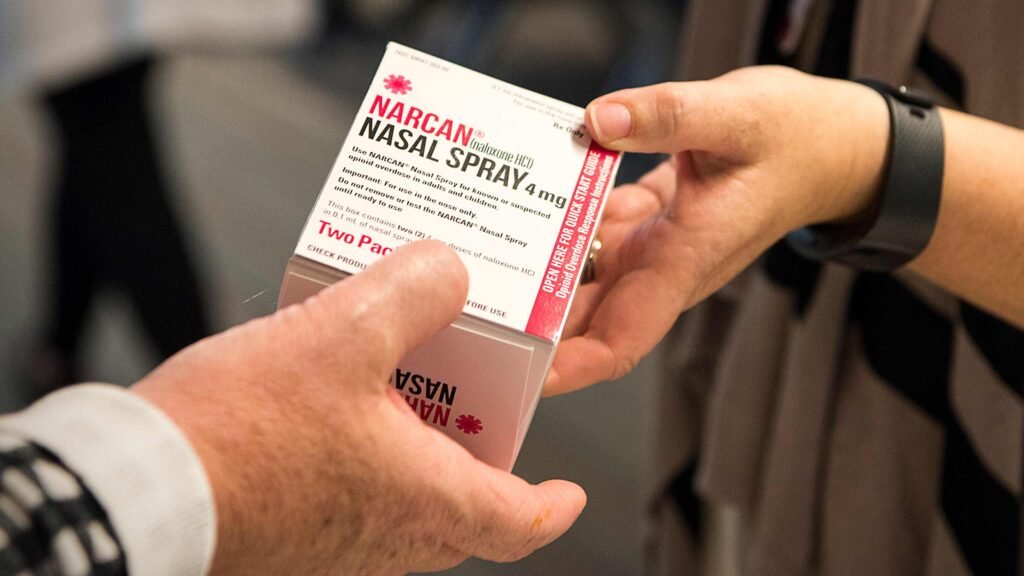
Get Naloxone
What is naloxone?
Naloxone is a medicine that rapidly reverses an opioid overdose. It is an opioid antagonist. This means that it attaches to opioid receptors and reverses and blocks the effects of other opioids. Naloxone can quickly restore normal breathing to a person if their breathing has slowed or stopped because of an opioid overdose. But, naloxone has no effect on someone who does not have opioids in their system, and it is not a treatment for opioid use disorder. Examples of opioids include heroin, fentanyl, oxycodone (OxyContin®), hydrocodone (Vicodin®), codeine, and morphine.
Learn more about naloxone here.
Get Naloxone
At Crawford County Drug and Alcohol Executive Commission (CCDAEC)
Located in: Downtown Mall
Address: 920 Water St #12, Meadville, PA 16335
Phone: (814) 724-4100
Call or go to CCDAEC at the Downtown Mall in Meadville, and ask for naloxone.
At your local Pharmacy
The Pennsylvania Department of Health leadership signed standing order prescriptions for naloxone. Print a document below and take it to your local pharmacy to obtain naloxone.
- Naloxone Standing Order – For General Public
- Naloxone Standing Order – For First Responders
- Co-Pay Assistance Program – Pennsylvania residents who purchase naloxone may be eligible to receive up to $75, from the Pennsylvania Department of Aging, to assist with the reimbursement of naloxone.
Mail-to-Home Naloxone Program
Individuals can get naloxone mailed to their home when completing a short training. Learn more on the NEXT Distro website.
Naloxone for First Responders Program
The goal of PCCD’s Naloxone for First Responders Program (NFRP) is to increase the availability of life-saving medication for individuals at greatest risk of opioid overdose as well as the systems most likely to interact with these individuals.
NFRP provides intranasal naloxone to priority first responder groups across Pennsylvania utilizing designated points of contact known as Centralized Coordinating Entities (CCEs). Learn more about the NFR program and eligibility.
Approved Trainings
In addition to talking to your healthcare provider or the pharmacist about how to use naloxone, individuals giving this medication to someone should take the online training ahead of time. Training is available through two approved training sites getnaloxonenow.org and PA Virtual training Network (PAVTN). This is also a great tool to learn How To Use Naloxone (video).
David’s Law – ACT 139
Act 139 is a law that allows first responders (law enforcement, firefighters, EMS) acting at the direction of a health care professional authorized to prescribe naloxone, to administer the drug to individuals experiencing an opioid overdose. The law also provides immunity from prosecution for those responding to and reporting overdoses. Additionally, individuals such as friends or family members in a position to assist a person at risk of experiencing an opioid-related overdose may receive a prescription for naloxone.
What does this mean for first responders?
First responder organizations may now obtain, carry, and administer naloxone in the event of an opioid overdose. According to Act 139, a non-licensed first responder agency must first enter into a written agreement with an Emergency Medical Services (EMS) agency.
What does this mean for members of the community?
Members of the community, family members, friends, and bystanders may be prescribed naloxone and can lawfully administer the drug to someone who is experiencing an overdose. Pennsylvania’s Physician General has written standing orders for the general public to be able to obtain naloxone without a prescription from their doctor. Although not necessary in order to obtain the medication it is recommended that individuals receive training to recognize the signs and symptoms of an overdose and to learn how to properly administer naloxone.
What is the Good Samaritan Provision?
Through the ‘Good Samaritan’ provision of Act 139, friends and loved ones are encouraged to summon emergency medical services by calling 911 in the event they witness an overdose. The law is meant to suppress the fear of arrest in calling authorities for an overdose event by offering certain criminal and civil protections for those that do. Law enforcement entities in other states that have implemented Good Samaritan protections for those who dial 911 in good faith have reported significant improvements in community relations.
Click the button below to access the Pennsylvania Department of Drug and Alcohol Programs (DDAP) Naloxone information page. There are links to trainings, background on Act 139, and more.